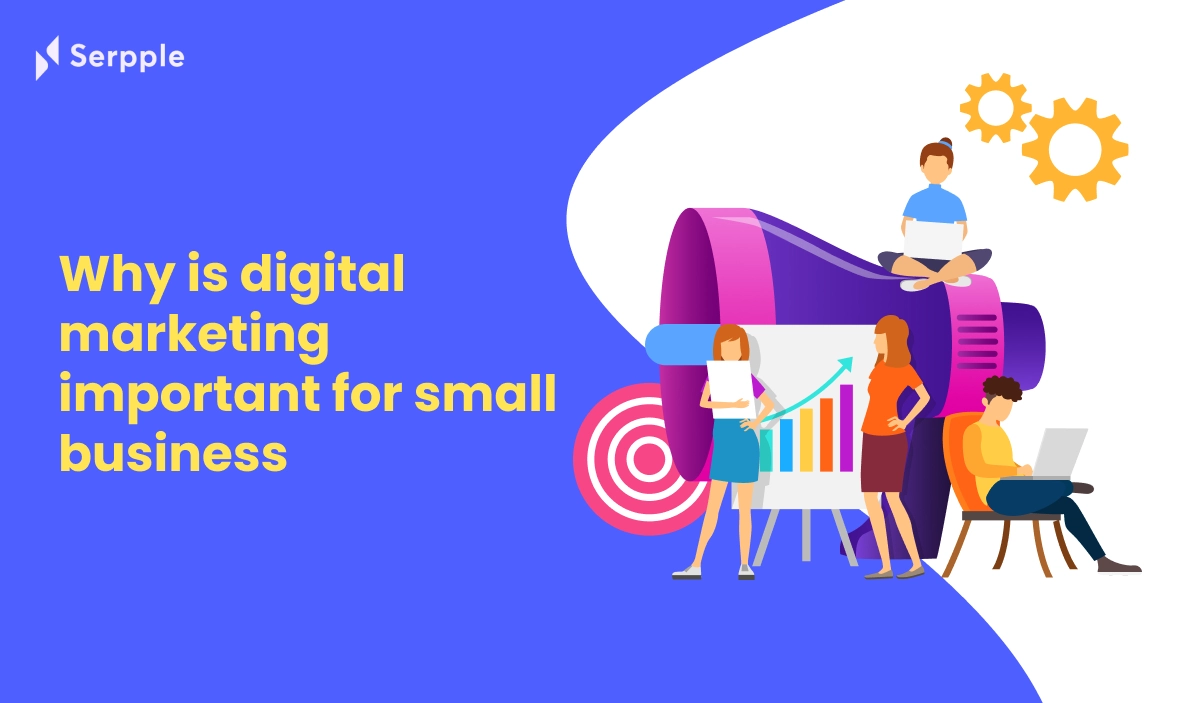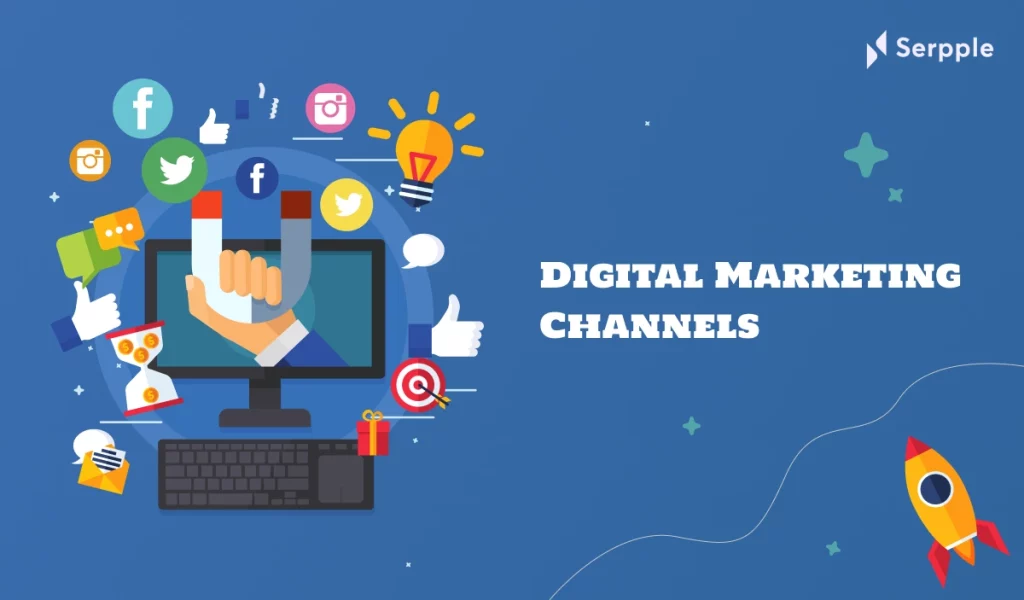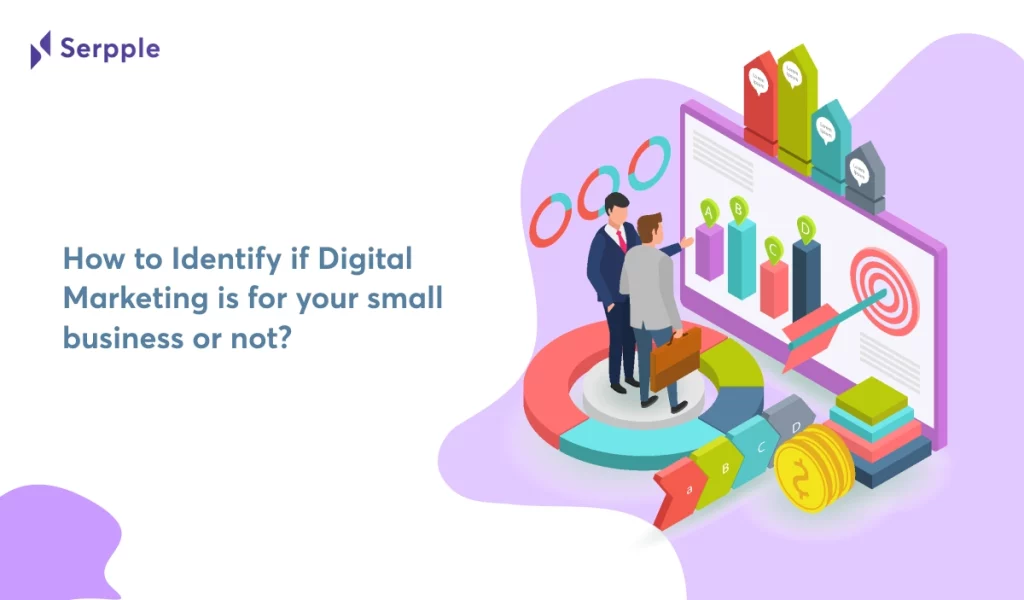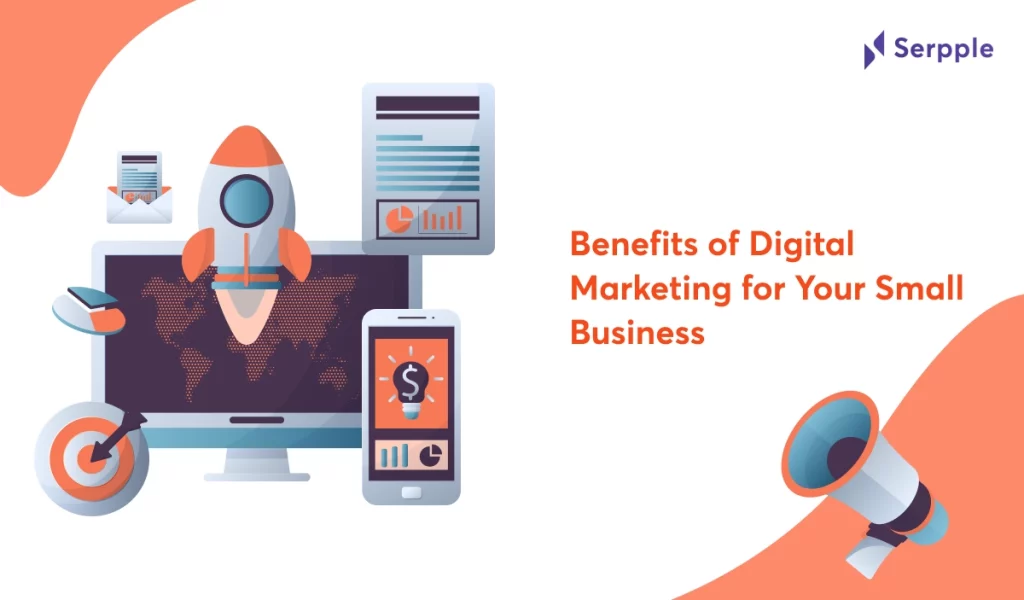
Marketing can be daunting when you are operating a small business. Usually, a small business has less number of employees as compared to medium or enterprise organizations.
With less number of employees and a limited budget, there are many constraints on a small business to maintain the growth of the business. However, you still need at least some sort of marketing to reach your potential customers.
According to Forbes, 99.9% of businesses across the US are small businesses, which means you are not the only one operating in this space.
When Small Businesses are started, their vital focus will be often to find the way to acquire the first customers through the door.
Businesses might believe that as they provide a good service or product, it will be a matter of time until they grab new customers towards their site.
In this case, small businesses must consider the global marketplace of online prospects and gain advantages from converging both traditional marketing and digital marketing.
If you are either a small business owner or a reputed business owner and looking to reach more potential clientele, 2023 is the right time. By applying the right digital marketing channels and strategy your small business can boom within no time.
But before proceeding, let’s understand what actually digital marketing is and its significance for small businesses.
What is Digital Marketing?
As a medium or small enterprise, with a limited marketing budget, the owners struggle to acquire good outcomes. The only prominent way to gain more profits and customers is to do marketing of services and products to the targeted potential customers.
The best approach to outreach to those potential customers is accompanied by Digital Marketing.
Digital marketing, referred to as online marketing, deals with making your business, made visible to potential clients, through online tools such as smartphones and computers.
While traditional marketing method depends on offline approaches. Digital marketing provides a highly streamlined approach, demands low manual efforts and makes sure to showcase the broad visibility of your business.
When it comes to digital marketing for your small business, there are various channels available. But also, it is significant to notice that not every channel would bring out positive outcomes, few would indeed be beneficial for your business.
The key relies on recognizing and choosing the appropriate channels that suit all your business needs efficiently and effectively.
Digital Marketing Channels

- Search Engine Optimization
- Paid Advertising
- Media Buying
- Affiliate Marketing
- Content Marketing
- Influencer marketing
- Social media marketing
- Email marketing.
- Video Marketing
- Retargeting
& many more. There could be more channels too, but these are the important ones. I will be explaining each of them very briefly for you to understand it
1. Search Engine Optimization (SEO):
SEO is about tweaking your website so that it shows up naturally on search engines like Google. When people search for things related to your business, you’d want your website to be one of the first they see.
When customers or prospects look for any services or products, they would tend to opt for the pages in the search engine that rank higher.
Standing out from the competition, at this stage, depicts that you’ll be grabbing new opportunities organically to drive a unique consistent flow of leads down your business sales funnel.
If you adopt SEO best practices, like website optimization, content creation and keyword research, enhancing ranking on the search engines would catch on easier.
2. Paid Advertising:
This refers to paying for ads on platforms like Google or social media. It’s like renting a billboard, but online. When done right, your ad can show up when potential customers search for specific keywords or browse their social feeds.
3. Media Buying:
Consider this as buying space for your ads on various online platforms, whether websites, apps, or even online radio stations. It actually makes sure that your business yields visibility at the perfect places.
4. Affiliate Marketing:
This is a way of partnering with others. You reward them (affiliates) for bringing in customers through their marketing efforts. It’s like having a team of promoters for your product or service.
Find the right affiliates and build out effective relationships. Regular communication with your affiliates keeps them always engaged with your program and valuable brand communication.
5. Content Marketing:
It deals with creating valuable content such as graphics, Videos or articles for engaging and attracting your target audience. Rather than promoting the product directly, you are offering them the entertainment or information to build trust with valuable customers.
6. Email Marketing:
One of the oldest forms of online marketing involves sending emails to potential and existing customers. It could be business updates, product promotions or any newsletters.
7. Social Media Marketing:
Use platforms like Facebook, Instagram, Twitter, and LinkedIn to promote your business. This sort of marketing is not just about ads, however it represents as to share stories, and updates thus making the audience engaged.
If you find the appropriate social media platform for your business, you incorporate into your strategy. Always remember that your business goal relies on strengthening your customer relationships and attaining the potential ones.
8. Influencer Marketing:
Partnering with individuals who have a strong following on social media or other platforms. Those influencers could support you in doing product promotion or promoting your services to the right audience.
9. Video Marketing:
Videos are a powerful way to convey messages. This can be in the form of advertisements, informational videos, or even live streaming.
Many people who were not interested in their humdrum routing turn on the video, for educational benefits and also for the entertainment that comes with it. They are the target audience in digital marketing phenomena.
10. Retargeting/Remarketing:
Ever noticed an ad for a product you recently viewed following you around online? That’s retargeting. It is a prominent approach to remind the reputed customers about your services or products as they do browsing on the internet.
How to Identify if Digital Marketing is for your small business or not?

By now, you must be wondering that yes digital marketing is a thing. But is it for my small business or not?
And as per a survey conducted by Workswit IT Solution 95% Of Small Businesses Will Increase Their Digital Marketing Spending In 2022.
There are a few steps you can take to determine whether your business could benefit from this digital marketing or not.
1. Get to Know Your Business Goals
Defining goals for your business assists you to have an understanding of how you could leverage digital marketing. By truly defining and understanding your business goals, you position your business on a trajectory that is both measurable and focused. Here’s why understanding these goals is pivotal when considering digital marketing:
Alignment with Digital Strategies: With many digital marketing strategies available, knowing your specific goals allows you to choose the right tactics.
For instance, if your goal is to increase brand awareness, then strategies like content marketing and social media engagement become crucial. If it’s lead generation, then paid advertising and SEO might take precedence.
Resource Allocation: Clearly defined goals allow you to allocate resources efficiently. Knowing what you want to achieve will let you decide how much budget, time, and manpower should be dedicated to a particular digital marketing effort.
Performance Metrics: Once your goals are set, you can determine the key performance indicators (KPIs) that will measure the success of your digital marketing endeavors. For example, if your goal is to increase online sales, metrics like online conversion rates, average order value, and website traffic become vital.
2. Get Aware of your target audience
To truly resonate in the digital era, one must not just speak, but speak to the right people. The vastness of the online world means messages can easily become lost, or worse, fall on deaf ears. Here’s the place where the significance, of pinpointing your audience seems important.
Profiling Ideal customer: Dive Deep to understand the psychographics, online behaviors and demographics of your ideal customers. By doing so, you not only understand where they spend their time online but also their pain points, aspirations, and preferences. This understanding allows for a tailored message that strikes a chord.
Platform Identification: Knowing your audience’s online habits helps determine the best platforms for engagement.
For instance, if they’re young entrepreneurs, they might frequent platforms like LinkedIn for professional insights and Instagram for lifestyle content. Similarly, if they’re tech enthusiasts, platforms like Reddit or specific YouTube channels might be more relevant.
Engagement through Value: As you rightly pointed out, understanding where your audience seeks knowledge is pivotal.
If someone is asking business-related questions on the platform Quora, you can be active in such platform giving insightful answers. It will position you as the industry expert and it yields out best visibility to your business offerings.
Customized Content Strategy: Understanding audience preferences allows for a tailored content strategy. If they prefer video content over blogs, investing time in creating video tutorials or webinars might be beneficial. If infographics or podcasts are their go-to’s, then that should guide your content creation efforts.
Feedback Loop Creation: Engaging with your audience doesn’t end after the initial contact. By getting to know your target group, you could foster a two-way communication channel, through different feedback, that refines your approaches and offering, ensuring it always aligns with evolving demands.
Optimized Marketing Spend: With clear audience insight, you can allocate your marketing budget more efficiently.
Spending on platforms and content types preferred by your target audience ensures higher ROI and more impactful brand interactions.
Building Trust and Loyalty: When your audience feels understood and catered to, it fosters trust. By consistently being present in their preferred online spaces and offering value, you not only become recognizable but also a trusted source of information or service.
3. Analyze your competition
In the business world, competition delves into an ever-present reality, irrespective of the firm’s size.
If you are a budding start-up or thriving as an established giant, there will be some competitors opposite to you vying for the attention of the same audience.
How do the competitors, communicate their brand with the audience and what provokes them as unique? How well will they engage their target audience? Is there any way for you to do better?
A great way to determine what all your competitors were doing to conduct research. Identify what platforms the competitors will use. Do they focus on specific keywords, are there any influencers utilized for driving user search traffic?
Some best online tools assist in doing keyword research and rank tracking like in Serpple.
There are some best online tools that assist in doing keyword research and rank tracking like in Serpple.
Interestingly, the presence of competition can be a silver lining—it signifies market validation, an indication that there’s a demand for your offerings.
Benchmarking: By keeping a close watch on your competitors’ digital marketing strategies, you can gauge the industry standards.
Do they invest heavily in content marketing, or do they depend more on paid ads? This offers you the essential benchmark to set out your own digital strategies.
Identifying Gaps: Competitor analysis can spotlight gaps in their strategies that you can capitalize on. Perhaps they’re neglecting a particular social media platform where a significant portion of your target audience hangs out. Or maybe there’s a specific type of content or service they haven’t tapped into yet.
Learning from Their Successes (and Failures): Observing competitors can provide valuable insights into what works and what doesn’t in your industry. If a competitor’s campaign goes viral, delve into the elements that made it a hit. Conversely, learning from their missteps can save you from making similar errors.
Innovative Strategy Development: Knowing the competition’s moves can push you to think outside the box. This will encourage innovative approaches that match their efforts and ensure their business outperforms others.
Budgeting Insights: A glimpse into the ad spending of your competitors and the business campaign investments could provide insights into where you may be required to do fund allocations.
While it’s not always about outspending them, it’s about spending smartly to achieve maximum impact.
Validating the Need for Digital Marketing: If your competitors are deeply invested in digital marketing, it’s a clear signal of its efficacy in reaching your shared target audience. Other side, if they are not, it can explicate a unique opportunity for gaining a digital edge.
4. Cost-efficient
The risk-reward ratio to set up a business which is already too heavy on the risk side, to adhere with an investment in traditional marketing.
Through digital marketing, rather than placing banners, renting billboards, printed flyers allow the owners to eliminate advertising costs.
If you plan to have a reasonable budget, then you could also hire a reliable marketing agency that assists you in enhancing your business.
Don’t hire any random digital marketing agency, perform some research and attempt to have a try for your business growth.
5. Assess Your Current Digital Presence and ORM
Whether you’re a local business serving a tight-knit community or a more expansive enterprise, the significance of assessing your online presence cannot be understated.
Website Analysis: Your website acts as the digital storefront for your business. Delving into its analytics can reveal invaluable insights into who’s visiting, their behavior, and the pathways they’re taking to find you.
For businesses with a local focus, understanding the specific keywords and search terms that lead visitors to your site can be particularly enlightening. You can explore potential keyword suggestions driving a broader audience to your site, along with assessing competitor keywords and content audit as well.
The potential of SEO: If “SEO” represents a term, you have gone through, but not been fully embraced, now it is a perfect time. SEO is not just alone the buzzword, rather it serves as a pivotal strategy to enhance your brand visibility.
By crafting content that addresses the particular demands and concerns of your target audience, you could boost your business’s organic reach. If you’re wondering, “Can your new website rank on Google?” the key often lies in generating valuable, relevant content. Investigate what’s already available online, and then think about how you can elevate or differentiate your content to provide added value.
Online Reputation Management (ORM): While your website and content are under your control, what’s said about you on other platforms can be equally impactful. ORM concentrates on managing and monitoring the reputation of your brand over digital platforms.
Customer Reviews and Feedback: Platforms like Yelp, Google My Business, and TripAdvisor host reviews that can influence potential customers. One has to indulge in addressing the negative feedback proactively and thank those who leave positive reviews of your product, which implies the commitment of your business towards customer satisfaction.
Social Media Sentiment: Monitor mentions of your brand on social media platforms to gauge the overall sentiment. User engagement, Sharing Positive stories and addressing peculiar concerns could improve your brand’s reputation.
Responding to Queries: If it may be a question on a community forum, a single or more comments on a blog post, or a direct message to the users, on social media, helpful and timely responses could uplift your brand image significantly.
Those parameters would certainly offer you a clear perception on knowing if digital marketing aligns with the demands of your business.
As thorough research seems crucial in any type of business endeavor, the factors hold true, during venturing into the realm of digital marketing. It is all about the groundwork, you lay off.
Benefits of Digital Marketing for Your Small Business

In this technology-driven dependent world, small businesses rely on the outreach of digital marketing campaigns, which are efficient and pocket-friendly that customers can access with just a click of a button.
Digital marketing is all about building a robust relationship with the audience and the company’s sales would surely follow suit. How far the digital marketing strategy helps small businesses with its benefits could be looked down on in this scenario.
1. Wider Reach:
Digital marketing tears down geographical barriers, enabling small businesses to reach global audiences. Unlike traditional methods which are often limited to local or regional exposure, digital platforms offer a vast, diverse audience right at your fingertips.
2. Precision Targeting
Gone are the days that cast a wide net and surfed for the best solutions. With the help of digital marketing, the audience can be targeted based on their interests, demographics and more. This checks out if your message outreaches the audience who were most likely to conversion
3. Measurable Outcomes:
One of the standout features of digital marketing is its inherent measurability. Tools like Google Analytics, equip businesses for tracking campaigns in real-time, refining strategies and gauging performance depending on concrete data. It is a boon to analyze return on investment (ROI).
4. Engaging Content:
The digital realm thrives on content—whether it’s an intriguing blog post, a captivating video, or interactive info graphics.
Digital marketing brings you the tools for disseminating and crafting content that acknowledges and entertains the audience, thus fostering brand loyalty and driving traffic.
5. Building Relationships on Social Media:
Social platforms are not just for posting updates—they’re hubs for interaction.
One of the greatest merits of using social media is crowdsourcing. Business yields valuable insights into the preferences and requirements of customers by listening to how they talk about the products online, and through active monitoring.
You can post messages, shares and comment on social media, so that Businesses can engage, directly with customers to seek feedback and nurture long-term relationships and customer engagement.
6. Gain Customer Loyalty
Through digital marketing, interact with customers, rectify their issues, answer their queries and execute a loyalty program, to turn out the brand loyal.
Customer loyalty is crucial to the success of the business as a happy and satisfied customer would not alone return however the customer would do recommendation of your brands to their family and friends.
7. Personalized Customer Experience:
Digital marketing empowers businesses to customize user experiences, From the start of email campaigns, tailored towards individual preferences, to site content, which adapts relying on personalization, and behavior driving deeper connection and paving the way to repeat businesses.
8. Efficiency through Automation:
Automation tools like MailChimp or HubSpot streamline repetitive tasks—be it sending out newsletters or managing leads. This not only conserves time and resources but also ensures consistent and timely customer interactions.
9. Seamless Integration:
Digital marketing isn’t an isolated function. Digital marketing intertwined with different business operations, commencing from customer services and sales to inventory management. Integrative tools, permit sharing of data over functions, to foster holistic business growth and enhance efficiency.
10. Remarketing
An important merit of digital marketing is the unique opportunity for remarketing. Customer who have previously expressed interest in your brand products could be targeted over multiple platforms in digital marketing unless they are converted.
For example, if someone left your online store, after adding a particular product in their cart, without purchasing it, you could remind the customers by showcasing an ad for that specific product on different digital platforms.
Conclusion
In this digital age, wherein the boundaries between real and virtual blur seamlessly, the promise of Digital marketing sounds like a beacon for businesses, especially start-ups.
By the way, Digital marketing for medium and small businesses is another path to gain awareness of the products they sell.
For small businesses, navigating this vastness may seem undoable initially, but therein lies an opportunity—a chance to forge connections, build bridges, and tell a story that only they can.
It is highly essential to keep in mind that when the digital sphere provides technologies and tools at its heart, it seems a realm powered by human connections.
Every click, share, and comment stems from a human emotion—be it curiosity, joy, or trust.
For small businesses, this is the place wherein magic truly lies. It’s not merely about numbers or analytics, but about weaving a narrative that resonates, touches lives, and that lingers long after the browser window closes.
Adam White
Posted on September 4, 2023
Adam White is a 20+ year SEO professional who has optimized over 400 websites, built and sold over 20 internet and SaaS businesses all with SEO as the main traffic source. Follow him on Twitter/X





